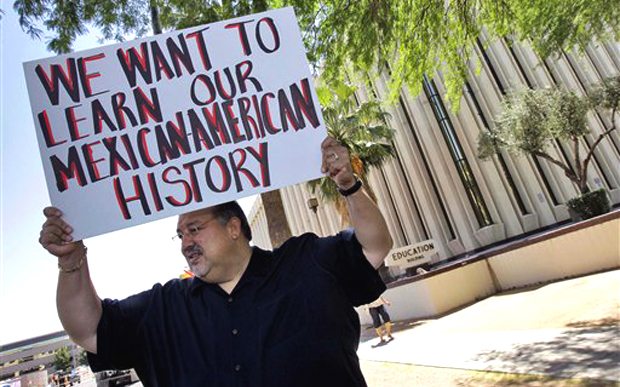A ruling in the case CURTIS ACOSTA, et al., Plaintiffs, vs. JOHN HUPPENTHAL, et al. Defendants, has been rendered out of United States District Court, District of Arizona. In short, the ruling was a crushing blow to the Mexican American Studies program out of Tucson, which is banned under current Arizona law. As Plantiffs’ attorney Richard Martinez said, “This ruling is the Dred Scott Decision for Mexican Americans.”
The decision’s introduction reads as follows:
This action was originally brought by several teachers and students at Tucson Unified School District No. 1 (“TUSD”) against various state officials including the Arizona Superintendent of Public Instruction, John Huppenthal. Plaintiffs challenge the constitutionality of Arizona Revised Statute § 15-112, which limits school districts’ ability to provide certain race-related curricula. Pending before the Court are cross- motions for summary judgment, Plaintiffs’ second motion for a preliminary injunction, and several other related motions.
As discussed below, Plaintiffs’ primary motion, with one exception, will be denied. The Court’s rulings stem in large part from the considerable deference that federal courts owe to the State’s authority to regulate public school education. The Court recognizes that, in certain instances, Defendants’ actions may be seen as evincing a misunderstanding of the purpose and value of ethnic studies courses. Equally problematic is evidence suggesting an insensitivity to the challenges faced by minority communities in the United States. Nevertheless, these concerns do not meet the high threshold needed to establish a constitutional violation, with one exception. Instead, they are issues that must be left to the State of Arizona and its citizens to address through the democratic process.
The crux of the the entire decision is quite revealing:
Read as a whole, the [Arizona] statute does not proscribe the rights of students to speak freely in the classroom. Instead, numerous facets of § 15-112 indicate that it is directed to school curricula. Thus, the statute expressly limits what a “school district or charter school” may do, and what a “program of instruction” may include. The exceptions enumerated in § 15-112(E) and (F) are similarly directed at certain “courses or classes” and “instruction.” Nowhere does the statute expressly limit what a student may or may not say; moreover, the penalty provision is directed exclusively at school districts that are in violation of § 15-112(A). Indeed, the target of the statute is concisely summarized by its title, “Prohibited Courses and Classes.”6 See Fla. Dep’t of Revenue v. Piccadilly Cafeterias, Inc., 554 U.S. 33, 47 (2008) (“[S]tatutory titles and section headings are tools available for the resolution of a doubt about the meaning of a statute.” (internal quotation marks omitted)). In short, the statute does not impinge on students’ right to speak freely in the classroom. Even if the statute could somehow be read to restrict such speech, the Court must reject that interpretation. See Zadvydas v. Davis, 533 U.S. 678, 689 (2001) (stating that if a proposed interpretation raises a “serious doubt” as to a statute’s constitutionality, court must “ascertain whether a construction of the statute is fairly possible by which the question may be avoided”). Accordingly, the Court rejects Plaintiffs’ First Amendment arguments to the extent that they assert an infringement of their right to speak freely on school grounds.
You can read the whole document here, but it is pretty clear right now that MAS will very likely not be returning to Tucson in 2013.




The Gnostics derived their http://633cash.com/Games leading doctrines and ideas from Plato and Philo, the Zend-avesta, the Kabbalah, and the Sacred books of India and Egypt; and http://633cash.com/Pengaturan” thus introduced http://633cash.com/Daftar into the bosom of Christianity the cosmological and theosophical speculations, which had formed the larger portion of the ancient religions of the Orient, http://www.cintaberita.com joined to those of the Egyptian, Greek, http://633cash.com/Promo and Jewish doctrines, which the Neo-Platonists had equally adopted in the Occident..It is admitted that the cradle http://633cash.com/Deposit of http://633cash.com/Withdraw Gnosticism is probably to be looked for in Syria http://633cash.com/Berita and even in Palestine. Most of its expounders wrote in that corrupted form of the Greek used by the Hellenistic Jews…and there was a striking http://633cash.com/Girl analogy between their doctrines and those of the Judeo-Egyptian Philo of Alexandria; itself the seat of three schools, at once philosophic and religious, the http://633cash.com/LivescoreGreek, the Egyptian, and the Jewish. Pythagoras and Plato, the most mystical of the Grecian philosophers (the latter heir to the doctrines of the former), and who had travelled, the latter in Egypt, and the former in Phoenicia, India, and Persia, also taught the esoteric doctrine…The dominant doctrines of Plutonism were found in Gnosticism